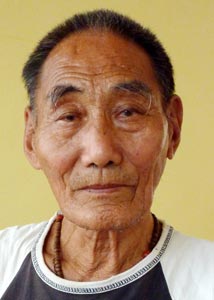Name: Sochoe
(Alias: No)
Gender: Male
Interview Age: 70
Date of Birth: 1940
Birthplace: Tomkho, Kham, Tibet
Year Left Tibet: 1959
Profession: Nomad
Monk/Nun: No
Political Prisoner: No

Interview No.: 7M
Date: 2010-04-08
Language: Tibetan
Location: Doeguling Settlement, Mundgod, Karnataka, India
Categories: Culture and History
Keywords: childhood memories, Chinese army -- invasion by , Chushi Gangdrug guerrillas, customs/traditions, escape experiences, houses/villages, Kham, nomadic life
Summary:
Sochoe was born into a nomadic family. His family possessed sheep, horses, yaks, dri 'female yak' and dzomo 'animal bred from a yak and a cow.' Ba and nagtsang were two kinds of tents that nomads used as living quarters. Sochoe gives a vivid account of how a ba is made from tsipa 'yak hair' and stoves are built inside from stone and clay. He also gives a clear profile of the social and religious life of the nomads. He remembers with nostalgia how it was a big challenge to protect their herd from bandits who came in groups with guns and drove away their animals.
Sochoe describes the multitude of people from different regions of Kham fleeing from the Chinese army through his nomadic region. Thousands of Chinese pursued them, shooting guns and dropping bombs on villages. Sochoe's family joined the escapees heading to Lhasa, which took four to five months. They avoided the Chinese soldiers by hiding during the day and travelling at night.
Sochoe joined the Chushi Gangdrug [Defend Tibet Volunteer Force] upon reaching Lhasa. He describes the encounters between the Chinese soldiers and Tibetan resistance group. After hearing about His Holiness the Dalai Lama's escape, Sochoe decided to flee also.
Interview Team:
- Marcella Adamski (Interviewer)
- Tenzin Yangchen (Interpreter)
- Pema Tashi (Videographer)

